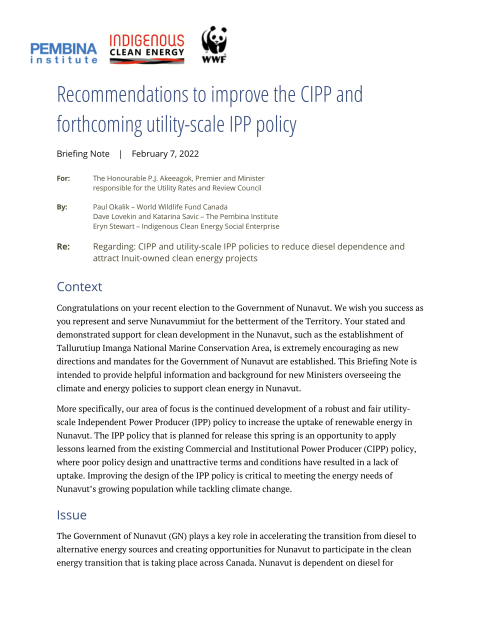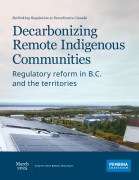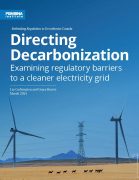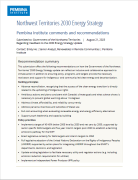Nunavut, with its remote location and the vast distances between its communities, has a unique energy landscape. It is almost entirely dependent on diesel power for meeting its electricity and heating needs, the highest diesel dependency of all territories and provinces. The territory’s continued reliance on diesel contributes to climate change, air quality concerns, and the negative health impacts from diesel spills on people, land and water.
The transition off diesel has been slow to date but some positive progress is being made. In order to accelerate the uptake of renewable energy in Nunavut it will be critical that the policies determining energy rates, terms and conditions, be improved. This will require special attention to the upcoming Independent Power Producer (IPP) policy and amendments to the Commercial, Institutional Power Producer policy. The IPP policy planned for release this spring is an opportunity to ensure that the energy needs of Nunavut’s growing population are met while tackling climate change.
Creating strong incentives for clean technology, renewable energy and energy efficiency in Nunavut must also be a priority for the federal government in meeting their 2030 goal to decarbonize the grid in remote communities and their 2035 goal of a net-zero electricity grid. The Government of Canada should proactively work with the Government of Nunavut to achieve these goals through programming, energy and policy support, and establishing a collaborative working relationship.
In this brief, we offer seven recommendations on how to improve policies so that they can accelerate the development of Inuit-led clean energy projects.
This briefing note was developed in collaboration between the Pembina Institute, WWF Canada and Indigenous Clean Energy.
Other resources
- First set of Pembina Institute recommendations (March 2019) to QEC to consider as they began developing their IPP policy
- Pembina Institute response and further set of recommendations to the URRC on the CIPP portion of the QEC policy submission (July 2020)
- Recommendations on QEC CIPP policy application (September 2020) in response to the CIPP policy proposal submitted to the Utility Rate Review Council May 2020








